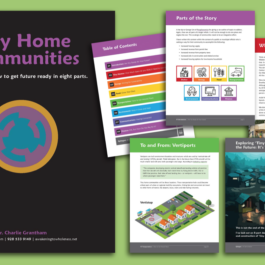What are the top 10 trends for the next ten years? Download the report here.
What do local governments have to get right to create brighter futures for their communities? Here are some highlights based on a Futures Friday conversation among fiscal policy expert and journalist Liz Farmer, government innovation expert Nick Kittle, and futurist Rebecca Ryan.
Digitizing Services
Use automation and transition services online to free local governments up to do the things that matter, like directly interacting with people, filling potholes, cleaning up parks, and much more.
Decide what to offer intentionally in person because it is the right thing to do and builds relationships and trust with all of their residents. The real challenge for local governments will be to build and maintain trust, not just whether or not to digitize services. According to the Chapman University Survey of American Fears, “Corrupt government officials” remains the #1 fear in America for the sixth year in a row. As services move online or become automated, local governments need to reconsider where and how they can create positive touchpoints and interactions with the community and the people they serve. Otherwise, online services may contribute to inequities because of the digital divide, including digital literacy and access to affordable and reliable broadband.
Leverage remote and online services to give more people the opportunity to participate and serve local government, including subject matter experts to shape debates. In the past, participating in local government (such as speaking at a public meeting) typically required everyone to show up in-person and on-site. Remote participation can support local governance and decision-making by expanding reach, inclusion, and expertise.
Innovation
Start by giving everyone a chance to think and brainstorm independently first before coming together to discuss, build on each other’s ideas, and find ways forward. You do not have to be in the same room (virtual or physically) to innovate. In fact, it's best to first start apart. Creative ideas can come to us anywhere – on a walk, in the shower, or in the middle of working on something else. Great ideas do not, however, come to us on demand during a specific time slot on a specific day. Starting with independent brainstorming helps innovation teams start with many different possible ideas and solutions when they do get together.
Enable innovation team members to develop and maintain regular relationships and interactions remote and in-person, which helps them successfully get pilot projects off the ground and implemented. Innovation takes place in two phases -- it's about creativity being implemented. Both are needed to be successful.
Individually practice the habits that nurture your creativity, push yourself to the edge of your thinking, and make actual time for deep work. You can find best-selling books on how good innovation actually happens and how to orchestrate it.
Suggested reading: Cal Newport’s Deep Work to make time for what really matters, and A World Without Email to consider systems and work cultures that enable deep work.
Improve your ability to change your lens or perspective. For example, do something every day that will make you deeply uncomfortable for a hot second. It can be something unusual, like writing a poem at midnight, lying down on the ground and staring at the ceiling for two minutes, or taking a different way home from work intentionally so you can notice things you might not notice otherwise. This approach provides you with mental resilience and an understanding of how to adapt. As you learn to do that, you will grow better and better at freeing your mind up and allowing your creative waves to connect.
If we were the city council for all cities in America, what long bets would we make now because we can see their payoff?
Liz: I would bet on municipal broadband. Yes, it’s possible – you can have a publicly operated government business entity that does not cost nearly as much as private companies and provide broadband service to everybody. Some local governments have done this already, most famously Chattanooga, TN.
Nick: The first thing I would tackle is land use planning. We need to plan land use for today and the future, not just based on the past.
Rebecca: I would require that every major decision that future councils make has something like a “seventh generation” consideration, e.g., What is our best guess about whether this decision will advantage or disadvantage our grandchildren's great-great-grandchildren. This way we integrate more long-termism into short-term decisions.
You can watch a recording of Liz, Nick, and Rebecca’s conversation here. Rebecca strongly recommends Liz’s substack, Long Story Short, and engaging Nick Kittle as a keynoter or subject matter expert on sustainable innovation.
If you enjoyed this post, please subscribe to our newsletter.

Yasemin Arikan
Yasemin (Yas) Arikan operates the research vessel. She is a futurist who uses foresight and social science methods to help clients understand how the future could be different from today and then use these insights to inform strategy and vision. Her work includes developing scenarios on the futures of public health, health care, society and technology for associations, foundations, government, and business. Bonus: Yas can help you take your gift wrapping game to the next level. And she can talk with you about it in English, German, or Turkish. Watch Yas' Q&A on how NGC helps organizations prepare for the future using Strategic Foresight.
Yasemin Arikan Promoted to Director of Futures Research
NEXT Generation Consulting (NGC) announced the promotion of Yasemin Arikan to Director of Futures Research. Arikan will lead the company’s efforts to...
Is Your Housing Market Ready for Your Future?
One of the biggest problems facing many cities and towns is inadequate housing. This problem is most acute for seniors, veterans with disabilities, and low-income groups ...
Three Things Martha Stewart Gets Right About Return to Office (RTO)
The original influencer and the person who invented the "Home" retail category, Martha Stewart, became the latest CEO to tell employees to get back to the office five day...








